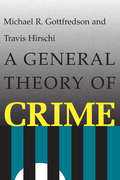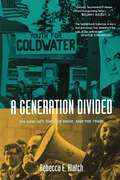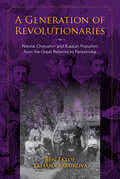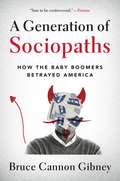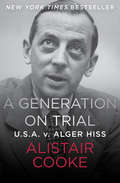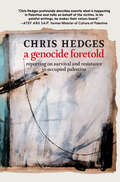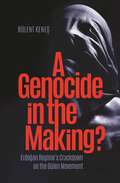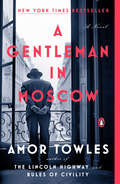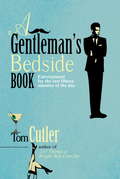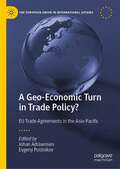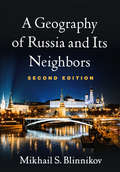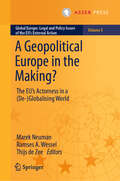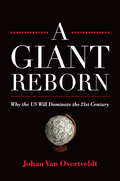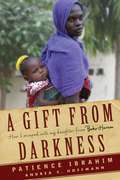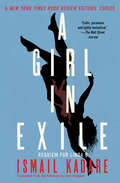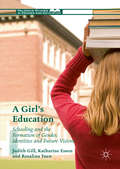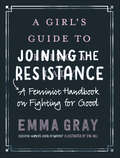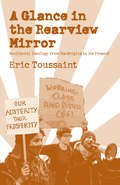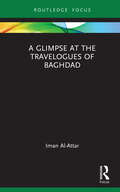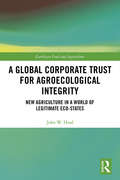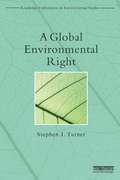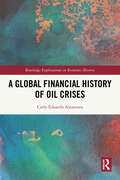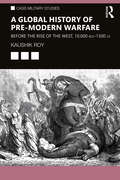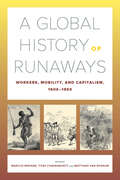- Table View
- List View
A General Theory of Crime
by Michael R. Gottfredson Travis HirschiBy articulating a general theory of crime and related behavior, the authors present a new and comprehensive statement of what the criminological enterprise should be about. They argue that prevalent academic criminology--whether sociological, psychological, biological, or economic--has been unable to provide believable explanations of criminal behavior. The long-discarded classical tradition in criminology was based on choice and free will, and saw crime as the natural consequence of unrestrained human tendencies to seek pleasure and to avoid pain. It concerned itself with the nature of crime and paid little attention to the criminal. The scientific, or disciplinary, tradition is based on causation and determinism, and has dominated twentieth-century criminology. It concerns itself with the nature of the criminal and pays little attention to the crime itself. Though the two traditions are considered incompatible, this book brings classical and modern criminology together by requiring that their conceptions be consistent with each other and with the results of research. The authors explore the essential nature of crime, finding that scientific and popular conceptions of crime are misleading, and they assess the truth of disciplinary claims about crime, concluding that such claims are contrary to the nature of crime and, interestingly enough, to the data produced by the disciplines themselves. They then put forward their own theory of crime, which asserts that the essential element of criminality is the absence of self-control. Persons with high self-control consider the long-term consequences of their behavior; those with low self-control do not. Such control is learned, usually early in life, and once learned, is highly resistant to change. In the remainder of the book, the authors apply their theory to the persistent problems of criminology. Why are men, adolescents, and minorities more likely than their counterparts to commit criminal acts? What is the role of the school in the causation of delinquincy? To what extent could crime be reduced by providing meaningful work? Why do some societies have much lower crime rates than others? Does white-collar crime require its own theory? Is there such a thing as organized crime? In all cases, the theory forces fundamental reconsideration of the conventional wisdom of academicians and criminal justice practitioners. The authors conclude by exploring the implications of the theory for the future study and control of crime.
A Generation Divided: The New Left, the New Right, and the 1960s
by Rebecca E. KlatchThe 1960s was not just an era of civil rights, anti-war protest, women's liberation, hippies, marijuana, and rock festivals. The untold story of the 1960s is in fact about the New Right. For young conservatives the decade was about Barry Goldwater, Ayn Rand, an important war in the fight against communism, and Young Americans for Freedom (YAF). In A Generation Divided, Rebecca Klatch examines the generation that came into political consciousness during the 1960s, telling the story of both the New Right and the New Left, and including the voices of women as well as men. The result is a riveting narrative of an extraordinary decade, of how politics became central to the identities of a generation of people, and how changes in the political landscape of the 1980s and 1990s affected this identity.
A Generation of Revolutionaries: Nikolai Charushin and Russian Populism from the Great Reforms to Perestroika
by Ben Eklof Tatiana Saburova“Anyone interested in digging deeper into some of the less-examined facets of late imperial and early Soviet Russia will be well rewarded.” —American Historical ReviewNikolai Charushin’s memoirs of his experience as a member of the revolutionary populist movement in Russia are familiar to historians, but A Generation of Revolutionaries provides a broader and more engaging look at the lives and relationships beyond these memoirs. It shows how, after years of incarceration, Charushin and friends thrived in Siberian exile, raising children and contributing to science and culture there.While Charushin’s memoirs end with his return to European Russia, this sweeping biography follows this group as they engaged in Russia’s fin de siècle society, took part in the 1917 revolution, and struggled in its aftermath. A Generation of Revolutionaries provides vibrant and deeply personal insights into the turbulent history of Russia from the Great Reforms to the era of Stalinism and beyond. In doing so, it tells the story of a remarkable circle of friends whose lives balanced love, family, and career with exile, imprisonment, and revolution.
A Generation of Sociopaths: How the Baby Boomers Betrayed America
by Bruce Cannon Gibney"Sure to be controversial."---Fortune magazineWhat happens when a society is run by people who are anti-social? Welcome to Baby Boomer America. In A Generation of Sociopaths, Bruce Cannon Gibney shows how America was hijacked by the Boomers, a generation whose reckless self-indulgence degraded the foundations of American prosperity. A former partner in a leading venture capital firm, Gibney examines the disastrous policies of the most powerful generation in modern history, showing how the Boomers ruthlessly enriched themselves at the expense of future generations. Acting without empathy, prudence, or respect for facts--acting, in other words, as sociopaths--the Boomers turned American dynamism into stagnation, inequality, and bipartisan fiasco. The Boomers have set a time bomb for the 2030s, when damage to Social Security, public finances, and the environment will become catastrophic and possibly irreversible--and when, not coincidentally, Boomers will be dying off. Gibney, whose 2011 essay "What Happened to the Future?" transfixed the investment world, argues that younger generations have a fleeting window to hold the Boomers accountable and begin restoring America. Distilling deep research into a witty, colorful indictment of the Boomers and an urgent defense of the once-unquestioned value of society, A Generation of Sociopaths is poised to become one of the most controversial books of the year.
A Generation on Trial: U.S.A. v. Alger Hiss
by Alistair CookeThe story of Whittaker Chambers, HUAC, and the case that defined the McCarthy era, as reported by one of the twentieth century&’s most respected journalists. In August 1948, a former Communist Party member named Whittaker Chambers testified before the House Un-American Activities Committee that a secret cell of Communists had infiltrated Franklin D. Roosevelt&’s New Deal administration. Chief among the conspirators, according to Chambers, was Alger Hiss, a former government attorney and State Department official who had taken part in the Yalta Conference and been instrumental in the creation of the United Nations. Hiss&’s categorical denial of the charges, which led Chambers to produce evidence linking both men to Soviet espionage, quickly escalated into one of the most divisive episodes in American history and ignited the widespread fear and paranoia of the McCarthy era. As the US correspondent for the Manchester Guardian, Alistair Cooke reported extensively on the Hiss affair. In an atmosphere that he memorably compares to that of a seventeenth-century religious war, Cooke maintained a clear head and his signature intellectual rigor. A Generation on Trial, which begins with a brilliantly succinct summary of the case—&“We are about to look at the trials of a man who was judged in one decade for what he was said to have done in another&”—is both a fascinating historical document and a stirring example of journalistic integrity.
A Genocide Foretold: Reporting on Survival and Resistance in Occupied Palestine
by Chris HedgesWith intimate and harrowing portraits of the human consequences of oppression, occupation, and violence experienced in Palestine today, Pulitzer-prize-winning journalist Chris Hedges issues a call to action urging us to bear witness and engage with the ongoing humanitarian crisis.Hedges wrote the first section of the book when he was in Ramallah in July 2024, and he draws from his experience doing extensive reporting from the Middle East, including Gaza, for the New York Times.A Genocide Foretold confronts the stark realities of life under siege in Gaza and the heroic effort ordinary Palestinians are waging to resist and survive. Weaving together personal stories, historical context, and unflinching journalism, Chris Hedges provides an intimate portrait of systemic oppression, occupation, and violence. The book includes chapters on:What life is like in Gaza City and Ramallah in the midst of approaching bombs and gunfire.The history of the dispossession of Palestinians of their land in relation to the ideology of Zionism.A portrait of Amr, a 17-year-old highschool student who is forced to evacuate his village with his family.Psychoanalysis of the state of permanent war that has led to the destruction of hospitals, telecommunications centers, governmental buildings, roads, homes universities, schools, and libraries and archaeological and heritage sites in Gaza.The ways in which the collective retribution against innocents is a familiar tactic employed by colonial rulers.A heartbreaking final chapter called &“Letter to the Children of Gaza.&”Hedges, the Pulitzer Prize–winning former Middle East Bureau Chief for The New York Times, is an Arabic speaker who spent seven years covering the conflict. He wrote the first section of the book when he was in Ramallah in July 2024. A Pulitzer-Prize winning journalist, he is also the author of two bestselling books, War is a Force that Gives us Meaning and The Greatest Evil is War. In A Genocide Foretold he writes with an emotional depth that can only be achieved from spending many years on the ground in Gaza and the West Bank. A Genocide Foretold is a call to action, urging us to bear witness and engage with the ongoing humanitarian crisis.
A Genocide in the Making?: Erdogan Regime's Crackdown on the Gülen Movement
by Bulent KenesThe Turkish government under the Erdoğan regime is undertaking a brutal crackdown against the participants of a civic group, namely the Gülen movement, also known as the Hizmet (service) movement, with the deliberate intention of destroying this social group, in whole or in part. In this extensive research, Dr. Keneş argues that this crackdown is filled with violations that may be classified at the very least as crimes against humanity and could very well be the harbinger of what comes next in terms of a full-scale genocide to exterminate thousands of innocent people. Keneş exemplifies many of these crimes and scales them against the genocide criteria according to definitions and norms accepted by United Nations and field experts.Given that the international community has historically downplayed the early signs of genocidal acts and thus failed to prevent such crimes many times before, it is necessary to be on the alert before the Erdoğan regime goes that far. A Genocide in the Making? is a unique volume that loudly cries out to the world this highly probable risk before it is too late.
A Gentleman in Moscow: A Novel
by Amor Towles<P> He can't leave his hotel. You won't want to. From the New York Times bestselling author of Rules of Civility--a transporting novel about a man who is ordered to spend the rest of his life inside a luxury hotel. <P>In 1922, Count Alexander Rostov is deemed an unrepentant aristocrat by a Bolshevik tribunal, and is sentenced to house arrest in the Metropol, a grand hotel across the street from the Kremlin. <P>Rostov, an indomitable man of erudition and wit, has never worked a day in his life, and must now live in an attic room while some of the most tumultuous decades in Russian history are unfolding outside the hotel's doors. <P>Unexpectedly, his reduced circumstances provide him entry into a much larger world of emotional discovery. Brimming with humor, a glittering cast of characters, and one beautifully rendered scene after another, this singular novel casts a spell as it relates the count's endeavor to gain a deeper understanding of what it means to be a man of purpose. <P><b>A New York Times Bestseller</b>
A Gentleman's Bedside Book: Entertainment for the Last Fifteen Minutes of the Day
by Tom CutlerHave you ever found that once you are between the sheets Madame Bovary is too heavy, magazines are too slippery, and The Guns of Navarone too long? In that case A Gentleman's Bedside Book is perfectly designed to satisfy those final moments of the days with facts, stories, ideas and instructions that will help every bright boy to become a smarter man with a well rounded curriculum of lessons in Science, English, Home Economics, R.E, Modern Languages, P.E, Art, Music and Woodwork. A lucky dip of bedside derring-do, humour, and oddity, written in his unique style by best-selling humourist Tom Cutler. Constantly surprising, ridiculously fascinating, and very, very funny.Includes such entries as: Human anatomy for the practical man; the most frequent dream subjects; delicious caustic curries you can make; Emergency meals from nowhere; Shaving: top tips from the pros; Deerstalkers and why they matter; How to grow a dashing moustache; How to open a Champagne bottle with a sword; Samuel Pepys: the rude bits; Best ever book titles; Tongue twisters; Those you may not marry, from The Book of Common Prayer; The worst ever movie dialogue; Useful foreign chat-up lines; An international swearing dictionary; filthy foreign food; Historic dumb predictions; The history of concrete; Dad rock; Coming out on top in a pub brawl; How to dissolve your wife; Mental arithmetic tricks for the practical man: ten tricks; Famous car crashes and victims; The seven habits of the highly effective Lothario; Really bad chat-up lines; Best urban legends: a list; Sword swallowing for fun and profit; How to develop a gigantic memory; Mind blowing mind reading for the complete novice.
A Gentleman's Bedside Book: Entertainment for the Last Fifteen Minutes of the Day
by Tom CutlerHave you ever found that once you are between the sheets Madame Bovary is too heavy, magazines are too slippery, and The Guns of Navarone too long? In that case A Gentleman's Bedside Book is perfectly designed to satisfy those final moments of the days with facts, stories, ideas and instructions that will help every bright boy to become a smarter man with a well rounded curriculum of lessons in Science, English, Home Economics, R.E, Modern Languages, P.E, Art, Music and Woodwork. A lucky dip of bedside derring-do, humour, and oddity, written in his unique style by best-selling humourist Tom Cutler. Constantly surprising, ridiculously fascinating, and very, very funny.Includes such entries as: Human anatomy for the practical man; the most frequent dream subjects; delicious caustic curries you can make; Emergency meals from nowhere; Shaving: top tips from the pros; Deerstalkers and why they matter; How to grow a dashing moustache; How to open a Champagne bottle with a sword; Samuel Pepys: the rude bits; Best ever book titles; Tongue twisters; Those you may not marry, from The Book of Common Prayer; The worst ever movie dialogue; Useful foreign chat-up lines; An international swearing dictionary; filthy foreign food; Historic dumb predictions; The history of concrete; Dad rock; Coming out on top in a pub brawl; How to dissolve your wife; Mental arithmetic tricks for the practical man: ten tricks; Famous car crashes and victims; The seven habits of the highly effective Lothario; Really bad chat-up lines; Best urban legends: a list; Sword swallowing for fun and profit; How to develop a gigantic memory; Mind blowing mind reading for the complete novice.
A Geo-Economic Turn in Trade Policy?: EU Trade Agreements in the Asia-Pacific (The European Union in International Affairs)
by Johan Adriaensen Evgeny PostnikovContemporary trade policy is increasingly framed in geo-strategic terms. But how much of that rhetoric is reflected in actual policy choices by the EU or its trading partners? This book provides a first systematic study of the broader international context in which EU trade agreements are conceived, negotiated, and designed. Building on a refined conceptualisation of geo-economics, the book develops a cogent framework that combines insights from scholarship on the design of free trade agreements with ideas from foreign policy analysis. Empirically, the analysis focuses on the relations between the EU and the Asia-Pacific. Following the United States’ pivot to Asia and the EU’s Global Europe strategy, China’s backyard has become the main arena in which global powers’ geo-economic strategies overlap. Building on a series of case-studies, combining the perspectives from the EU and its trading partners, the book shows that the rhetoric of geo-economic competition is yet to catch up with the actual negotiation and design of free trade agreements. This volume will be of great interest to scholars, students and practitioners who want to gain a holistic understanding of contemporary trade negotiations.
A Geography of Russia and Its Neighbors, Second Edition
by Mikhail S. BlinnikovAuthoritative yet accessible, the definitive undergraduate text on Russian geography and culture has now been thoroughly revised with the latest data and hot topics, such as the political crisis in Ukraine and the annexation of Crimea and Sevastopol. Thematic chapters provide up-to-date coverage of Russia's physical, political, cultural, and economic geography. Regional chapters focus on the country's major regions and the other 14 former Soviet republics. Written in a lucid, conversational style by a Russian-born international expert, the concise chapters interweave vivid descriptions of urban and rural landscapes, examinations of Soviet and post-Soviet life, deep knowledge of environmental and conservation issues, geopolitical insights, engaging anecdotes, and rigorous empirical data. Over 200 original maps, photographs, and other figures are also available as PowerPoint slides at the companion website, many in color. New to This Edition *Separate chapter on Ukraine and Crimea. *Timely topics--the political crisis in Ukraine and annexation of Crimea and Sevastopol; the return of Putin as president; climate change and environmental degradation; economic slowdown; political shifts in the republics; the role of Russian-backed forces in Syria, Libya, and Central African Republic; changes in Russia–United States relations; and more. *Thoroughly updated population, economic, and political data. *80 new or updated figures, tables, and maps. Pedagogical Features *End-of-chapter review questions, suggested assignments, and in-class exercises. *Within-chapter vignettes about Russian places, culture, and history. *End-of-chapter Internet resources and suggestions for further reading. *Companion website with all figures and maps from the book, many in full color.
A Geopolitical Europe in the Making?: The EU’s Actorness in a (De-)Globalising World (Global Europe: Legal and Policy Issues of the EU’s External Action #5)
by Ramses A. Wessel Marek Neuman Thijs De ZeeThis edited book investigates whether ─ and if so, to what extent ─ the European Union began to turn its recently uttered ambition of becoming a geopolitical Union into practice. It does so by bringing a range of scholars from various institutions and disciplines ─ among others, political science, European law, European studies ─ together, asking them whether in their specific field, they can observe a geopolitical turn in the European Union's policy-making. The result of this intellectual endeavour can be found in this book; a book that makes a first attempt at empirically testing the Union's ability to effectively respond to ever- and rapidly-changing conditions for conducting international politics in a rule-based system. The volume is divided into two separate, yet mutually informing, parts. Part I consists of a series of empirical chapters assessing the EU's actorness vis-à-vis other regional powers, regional and international organisations. This is followed by several empirical snapshots looking into specific policy areas in Part II. As we combine the insights from both parts, we attempt to contribute to the debate on the changing nature of the European Union in challenging times. Our approach, then, is primarily an empirical one. And yet, building upon these conclusions, we are able to also draw conceptual conclusions about the EU's increasing geopolitical nature, or the lack thereof. These conclusions make this a relevant read not only for academics, but also for practitioners of European law and European integration. Marek Neuman is Assistant Professor in EU Foreign Policy and Jean Monnet Chair of European Politics and Governance at the Faculty of Arts of the University of Groningen, The Netherlands. Ramses A. Wessel is Professor of European Law at the Faculty of Law of the University of Groningen, The Netherlands. Thijs de Zee is a PhD Candidate at the Faculty Campus Fryslân of the University of Groningen, The Netherlands. Chapter 3 is available open access under a Creative Commons Attribution 4.0 International License via link.springer.com.
A Giant Reborn
by Johan Van OvertveldtThe world is in turmoil. Whether one looks at Europe, Asia, North America, the Middle East, Africa, or Latin America, uncertainty and upheaval seem to be the order of the day. Nevertheless, there seems to be an odd certainty in the minds of many pundits, writers, and citizens in this highly volatile world of geopolitics: the days of the United States as the world's sole superpower are over. The consensus tells us that the United States will not be able to keep a status as a major power among China, the European community, and a resurgent Russia. How realistic is this perspective, though? Is the "air of inevitability" concerning America's demise merely a passing breeze? How solid is the "unstoppable rise" of the Chinese? How likely is it for Europe to right its ship? A Giant Reborn, from critically acclaimed author and leading economic journalist Johan Van Overtveldt, dispels many of these ingrained assumptions and argues that the 21st century will be defined by the country currently best set up to succeed: the United States of America. In the current chaotic political climate it seems risky to say any country will be able to maintain its current status. But Van Overtveldt provides a measured, insightful, and thoroughly engaging examination of the evidence. In his richly detailed style and straightforward explanations, he masterfully lays out a case for why America, against many pundits' best predictions, is set up to continue its 20th-century success into this millennium. A Giant Reborn shows readers that the reports of America's death, to paraphrase the father of American literature, have been greatly exaggerated.
A Gift from Darkness
by Andrea Claudia Hoffmann Patience IbrahimThe inspirational story of a pregnant young Nigerian woman and the horrors she endured to save her unborn child when she was kidnapped by Boko Haram.When she was nineteen, Patience Ibrahim's first husband was murdered by Boko Haram. She fled to the safety of her village and remarried several months later. Having prayed for a child for years, Patience is overjoyed when she discovers she is pregnant. But her joy is short-lived: Boko Haram soldiers are at her door. Brutally abducted and forced to convert to Islam, she lives in constant terror of what her kidnappers have in store for her. She finds herself alone in the world and fears her life is over. For two months, Patience hides her pregnancy while facing the brutalities meted out by Boko Haram. By the sheer force of her determination to protect her baby, she and her child are able to survive. Now, she has entrusted journalist Andrea C. Hoffmann with her story, a powerful first-person account of Boko Haram's atrocities in Nigeria and Cameroon.One of the first testimonies on the terrorist group's war crimes in Western Africa, A Gift from Darkness poignantly shows the human toll of a crisis that demands attention.
A Girl in Exile: Requiem for Linda B.
by Ismail KadareA New York Times Book Review Editors’ Choice“Erotic, paranoiac and lightly fantastical.” —The Wall Street Journal“Ismail Kadare's readers are astonished every year when the Nobel committee overlooks him. . . . A Girl in Exile, published in Albanian in 2009, may rekindle the worldwide hopes.” —The New York Times Book ReviewDuring the bureaucratic machinery of Albania’s 1945–1991 dictatorship, playwright Rudian Stefa is called in for questioning by the Party Committee. A girl—Linda B.—has been found dead, with a signed copy of his latest book in her possession.He soon learns that Linda’s family, considered suspect, was exiled to a small town far from the capital. Under the influence of a paranoid regime, Rudian finds himself swept along on a surreal quest to discover what really happened to Linda B.“At a time when parts of the world are indulging nostalgia for communism, Kadare’s novel confronts the infuriating impossibility of art in an autocratic, anti–individualist system.” —The Washington Post“A Girl in Exile confirms Kadare to be the best writer at work today who remembers—almost aggressively so, refusing to forget—European totalitarianism.” —The New Republic
A Girl's Education: Schooling and the Formation of Gender, Identities and Future Visions (Palgrave Studies in Gender and Education)
by Judith Gill Katharine Esson Rosalina YuenThis book argues that educators and the general public have become complacent about girls' education as a consequence of the more recent fuss about problems for boys. After an analysis of persistent disquiet about girls' lifestyles, it uses theories of gender and education to demonstrate that girls are being produced in contradictory ways in current schooling. Many girls develop a sense of themselves through close connection with friendship groups but schooling processes typically require them to adopt the position of competitors in the end-of-school rankings and to act out their individualized positions in imagining themselves into the future. Ultimately the work offers insight and understanding leading to a less divisive educational pathway for girls.
A Girl's Guide to Joining the Resistance: A Feminist Handbook on Fighting for Good
by Emma GrayAn illustrated big-sister's guide to activism—the perfect gift for young feminists and long-time observers looking to enter the fray.Have recent events given you pause? Does Trump’s America make you fearful for the future of women? Do you want to become more involved in helping to preserve women’s rights but aren’t sure how? In A Girl’s Guide to Joining the Resistance, Emma Rose Gray, Executive Editor at The Huffington Post, outlines all that young women need to know on pivotal women’s rights issues and offers a blueprint for those who want to take a stand and participate in the cause. This groundbreaking book includes: • Background information on key issues so you can choose where you most want to take a stand.• A guide for learning about the first Amendment and how to choose good news sources and make sure you’re getting quality information.• Practical instructions on how to get involved and stay involved, with examples from the author’s own experience organizing the successful “Watch Us Run” conference. • Instructions for how to talk to your friend who says she’s “just not that political” and your relatives whose beliefs conflict with your own. • Advice for self-care and how to stay involved without exhausting yourself. • Extensive back-matter including numbers to call, organizations to email and donate to, and scripts for reaching out to representatives and organizations. • Interviews with experienced activists including senator Elizabeth Warren, actress Amber Tamblyn, actress Marlo Thomas, Women’s March Co-Chair Carmen Perez, Mother of the Movement Lucy McBath, Black Lives Matter creator Alicia Garza, People for Bernie Founder Winnie Wong, and former assistant to President Obama Tina Tchen. Featuring original 2-color illustrations throughout by New York Magazine’s Eva Hill, A Girl’s Guide to Joining the Resistance illuminates why the time has never been more important than now to get involved in helping to ensure women’s rights are protected for the current and future generations of women.
A Glance in the Rear View Mirror
by Eric ToussaintAs the financial crisis continues to shake the economy it has begun to expose cracks in the ideology long used to justify neoliberal policies. This informed and accessible primer drives a wedge into these cracks, allowing the non-expert to understand the flaws in the economic philosophy of the 1%.
A Glimpse at the Travelogues of Baghdad (Routledge Focus on Literature)
by Iman Al-AttarThe history of Baghdad in the 18th and 19th centuries had predominantly been written by two groups. The first group is Baghdadi scholars, and the second group is travellers. These two resources complement each other; while the literature of Baghdadi scholars provides insights from inside, travelogues provide observations from outside. By implementing this interlocking method of investigation, we can reach a comprehensive understanding of the history of Baghdad. Having investigated some sources from inside in my previous book; Baghdad: an urban history through the lens of literature, the focus of this book is on travel literature. The history of travelogues throughout different periods of Baghdad’s history is highlighted, with a particular focus on 18th and 19th century travelogues. This period was a critical epoch of change, not just in Baghdad, but across the world. Nevertheless, this book does not intend to provide a documentary of the travellers who visited Baghdad. It is rather an analytical study of the colonial literature in relation to the historiography of Baghdad.
A Global Corporate Trust for Agroecological Integrity: New Agriculture in a World of Legitimate Eco-states (Earthscan Food and Agriculture)
by John W. HeadThis book examines global environmental governance and how legal, institutional, and conceptual reform can facilitate a transformation to a new ‘natural-systems’ form of agriculture. Profound global climate disruption makes it essential that we replace our current agricultural system – described in this book as a fossil-carbon-dependent ‘modern extractive agriculture’ – with a natural-systems agriculture featuring perennial grains growing in polycultures, thereby mimicking the natural grassland and forest ecosystems that modern extractive agriculture has largely destroyed. After examining relevant international legal and conceptual foundations (sovereignty, federalism, global governance) and existing international organizations focusing on agriculture, the book explores legal and institutional opportunities to facilitate dramatic agricultural reform and ecological restoration. Among other things, it explains how innovative federalism structures around the world provide patterns for reorienting global environmental governance, including what the book calls eco-states that would, through exercise of pluralistic sovereignty, be responsible for agroecological management. Drawing from his experience working in international institutions, the author provides detailed global-governance proposals for facilitating the type of agricultural reform that can help avoid ecological collapse, especially through soil degradation and climate change. This book will be of great interest to students and scholars of international law, agroecology, climate change, ecological restoration, sustainable development, and global governance, as well as policy-makers and practitioners working in these fields.
A Global Environmental Right (Routledge Explorations in Environmental Studies)
by Stephen TurnerThe development of an international substantive environmental right on a global level has long been a contested issue. To a limited extent environmental rights have developed in a fragmented way through different legal regimes. This book examines the potential for the development of a global environmental right that would create legal duties for all types of decision-makers and provide the bedrock for a new system of international environmental governance. Taking a problem solving approach, the book seeks to demonstrate how straightforward and logical changes to the existing global legal architecture would address some of the fundamental root causes of environmental degradation. It puts forward a draft global environmental right that would integrate duties for both state and non-state actors within reformed systems of environmental governance and a rational framework for business and industry to adhere to in order that those systems could be made operational. It also examines the failures of the existing international climate change regime and explains how the draft global environmental right could remedy existing deficits. This innovative and interdisciplinary book will be of great interest to policy-makers, students and researchers in international environmental law, climate change, environmental politics and global environmental governance as well as those studying the WTO, international trade law, human rights law, constitutional law and corporate law.
A Global Financial History of Oil Crises (Routledge Explorations in Economic History)
by Carlo Edoardo AltamuraIn this book, Altamura analyses the oil shocks of 1973 and 1979, considering their impact on the world economy and subsequent reactions to the global instability.In terms of actors, the focus is on how international organisations such as the IMF, World Bank and OECD responded to the crisis, as well as the behaviour of commercial banks and central banks and of countries in the Global South. Altamura draws on newly available archival material from private financial institutions to paint a full picture of a rapidly changing world which paved the way for stagflation and interdependency.This monograph will be illuminating reading for economic and financial historians, plus scholars looking at energy history, the Cold War in a global context, the New International Economic Order and the political economy of the 1970s.
A Global History of Pre-Modern Warfare: Before the Rise of the West, 10,000 BCE–1500 CE (Cass Military Studies)
by Kaushik RoyThis book examines the military histories of the regions beyond Western Europe in the pre-modern era. Existing works on global military history mainly focus on the western part of Eurasia after 1500 CE. As regards the ancient period, such works concentrate exclusively on Greece and Rome. So, ‘global’ military history is actually the triumphal story of the West from Classical Greece onwards. This volume focuses not only on the eastern part of Eurasia but also on South America, Africa and Australasia and seeks to explain the history and varied trajectories of warfare in non-Western regions in the pre-modern era. Further, it evaluates whether warfare in non-Western regions should be considered primitive or inferior when compared with Western warfare. The book notes that Western Europe became militarily significant only in the early modern era and argues that the military divergence that occurred during the early modern era is not unique – it had also occurred in the Bronze Age, the Classical era and in the medieval period. This was due to the dynamism and innovativeness of non-Western militaries and the interconnectedness that existed in parts of the Eurasian landmass. Further, those polities which were able to construct a balanced military force by synthesising diverse elements were not only able to survive but also became capable of projecting power across continents. This book will be of much interest to students of military history, strategic studies and world history.
A Global History of Runaways: Workers, Mobility, and Capitalism, 1600–1850 (California World History Library #28)
by Marcus Rediker, Titas Chakraborty and Matthias van RossumDuring global capitalism's long ascent from 1600–1850, workers of all kinds—slaves, indentured servants, convicts, domestic workers, soldiers, and sailors—repeatedly ran away from their masters and bosses, with profound effects. A Global History of Runaways, edited by Marcus Rediker, Titas Chakraborty, and Matthias van Rossum, compares and connects runaways in the British, Danish, Dutch, French, Mughal, Portuguese, and American empires. Together these essays show how capitalism required vast numbers of mobile workers who would build the foundations of a new economic order. At the same time, these laborers challenged that order—from the undermining of Danish colonization in the seventeenth century to the igniting of civil war in the United States in the nineteenth.
